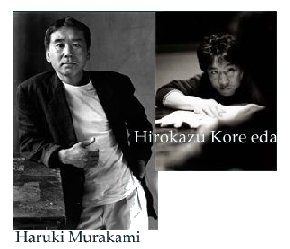Hana and Haruki

Happy Birthday to Haruki Murakami.
He is 58 years old today. He is a dilligent climber according to a new astrology which combines western and chinese astrology. His sun is in Capricorn and moon is in Gemini; he is glib, witty, clever and awfully ambitious.
In this post I would like to show samples of the magic of Murakami and Kore eda; how their works intersect to win world wide respect and support.
Kore-eda was asked why he decided to set the film at the turn of the 18th century and what attracted him to the samurai genre? He stated that initially he came up with the idea after 9/11 when the spirit of vengefulness was at a peak. He wanted to make a film with the theme of revenge, but, he wanted it to be a comedy or to have comedic elements. He then wondered what the film might be like if it was about a samurai who was compelled to avenge someone’s death but who really didn’t want to? Also, currently in Japan there is a resurging obsession with the samurai warrior code, which makes Kore-eda uncomfortable. He wanted to somehow address these patterns of vengefulness appearing once again in human history to comment upon how they interfere with peace. (via Twitch)
Hana (Yori Naho) Trailer on youtube.
Here is a review of Kore eda’s recent film “Hana” by Robixsmash.
(How U.S. fans of Kore eda films will get to see this film is another matter. I am still waiting to see “The Sun” by Sokurov and more recent films by Claire Denis. It is getting harder and harder for us to see foreign films.)
Tony Takitani Murakami’s short story)
The actress Rie Miyazawa who appears in “Hana” also play two parts in “Tony Takitani”; three different characters from two films. Besides Rie Miyazawa playing characters in their projects, there are other interesting convergences between Haruki Murakami and Hirokazu Kore eda. They both studied at Waseda University. The Sarine terrorist attack on the subway in Japan captivated their interest. Murakami wrote the non-fiction “Underground” interviewing the families of victims. Kore eda did the same and featured his concerns in a film called “Distance” (which I have not seen).
Moving beyond the mid 20th century post war era of Mishima, Kurosawa, Ozu, Kawabata and Oe; using their unique, patient craftsmanship and versatility, Murakami and Kore eda are great storytellers of life as it is lived in late 20th Century Japan . By probing the inner lives of their protagonists, they convey the universality of the lonely, fragile human condition. They both, curiously, maintain their Japaneseness by being true to themselves and their love for humanity.
Murakami’s short story “On seeing the 100% perfect girl one beautiful spring morning” is illustrated in a visual web project by Steph Tai.
More short stories by Haruki Murakami from this site. (Beginning with A Long Way from a Stuffed Cabbage and others)
The Folklore of Our Times (The new yorker)
I read Tony Takitani online from the New Yorker magazine long before the film was released. I now have a DVD of “Tony Takitani”. The film was even better with Issey Ogata (my favorite actor) playing Tony Takitani.
“Kafka on the Shore” was included in the list of the 10 best novels of 2005.
Haven’t seen any Kore eda films? “Nobody Knows” and “After Life” are great films and hopefully are available at most videostores or your local library. (My library has them even though they do not stock enough great literature old and new.)